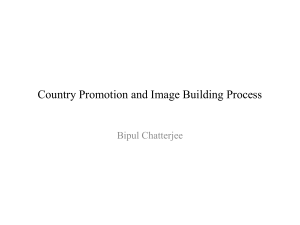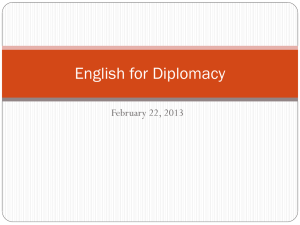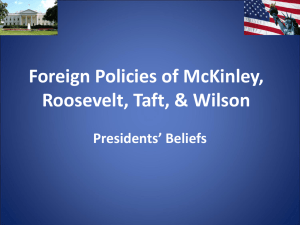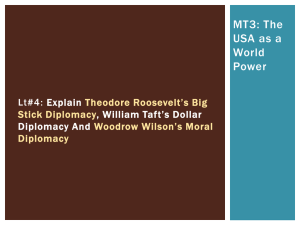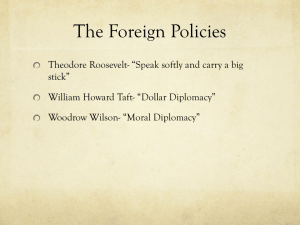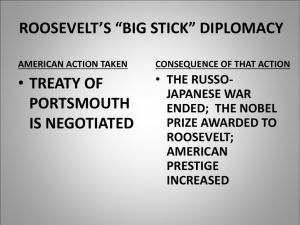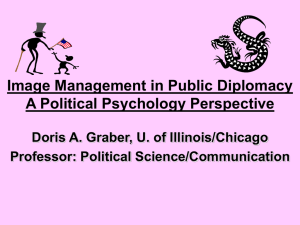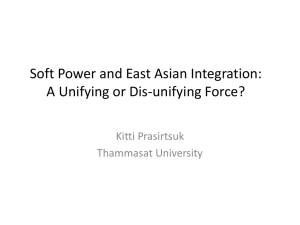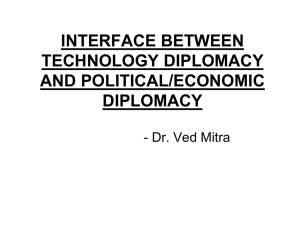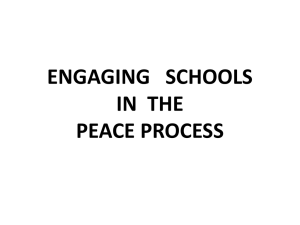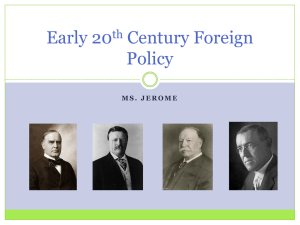Science For Diplomacy… - The Rockefeller University
advertisement
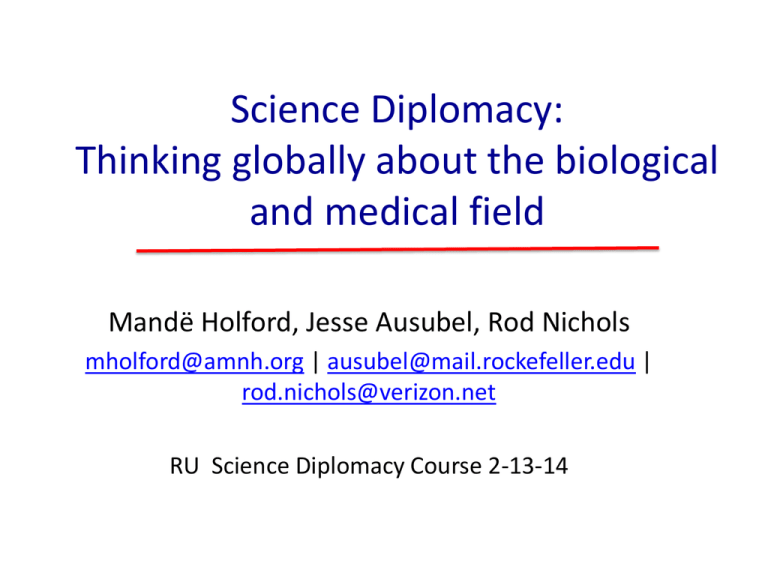
Science Diplomacy: Thinking globally about the biological and medical field Mandë Holford, Jesse Ausubel, Rod Nichols mholford@amnh.org | ausubel@mail.rockefeller.edu | rod.nichols@verizon.net RU Science Diplomacy Course 2-13-14 Science Diplomacy = Influencing policies that affect science…. Science Diplomacy = Influencing policies that affect science…. WHY is Science Diplomacy having a resurgence? Climate Change Resource Scarcity Economic Capacity Building Infectious diseases Conflict Resolution Global challenges with borderless complexities WHAT is Science Diplomacy? Putting your best face forward…. WHY is Science Diplomacy having a resurgence? We’re the good guys & gals… Scientists & Technology have high poll numbers Science Diplomacy engages all elements of traditional diplomacy Smart New Frontiers in Science Diplomacy, The Royal Society, 2010 History of Science Diplomacy Russell-Einstein Manifesto 1955 Weapons of mass destruction First conference 1957, 22 scientists UK, USA, Japan, Canada, Australia, Soviet Union From the silk road to Pugwash…. History of Science Diplomacy The Rockefeller University & scientific cooperation between nations in conflict Physicist Frederick Seitz President, The Rockefeller University 1966-1978 As member of US Army, participated in 1945 in re-location of German scientists First leader of the NATO Science Office: Created fellowship program, summer studies Autobiography, A Life in Science Operation Paperclip! Joshua Lederberg, President RU 1978-1990 GLOBAL INFECTIOUS DISEASE SURVEILLANCE AND EARLY WARNING SYSTEMS: PROMED AND PROMED-MAIL Stephen S. Morse, Columbia University, 2007 A Brief History of ProMED and ProMED-Mail ProMED had its roots in the same Institute of Medicine report that led to the development of the Forum on Microbial Threats (IOM, 1992). The Committee that developed the 1992 IOM report was chaired by Joshua Lederberg and the late Robert E. Shope. After the report was released, there was considerable concern about maintaining the momentum… In an attempt to fill what many (including this author) saw as the fragmentation of disease surveillance systems and the lack of global capacity, ProMED was begun in 1993 under the auspices of the Federation of American Scientists…The group held a small initial organizational meeting in February 1993 at The Rockefeller University in New York… Authors: Joshua Lederberg, Robert E. Shope, and Stanley C. Oaks, Jr., Editors; Committee on Emerging Microbial Threats to Health, Institute of Medicine History of Science Diplomacy Alexander Keynan, microbiologist, Adjunct member of RU faculty for many years Co-chaired the Committee for Scientific Cooperation between Israel and Egypt from 1979 to 1984. Scientific Cooperation, State Conflict: The Role of Scientists in Mitigating International Discord (Annals of the New York Academy of Sciences, 1998) Editors, Allison L. De Cerreno and Alexander Keynan Torsten Wiesel,President RU 1991-1998 Israeli-Palestinian Science Organization http://www.ipso-jerusalem.org/ They may come from worlds apart, but leading political and environmental figures from Israel, Jordan, and the Palestinian Authority have found a common theme to bring them together – the Great Rift Valley... The multi-national group – under the moniker of the Dead Sea Triangle (DST) – has met twice recently, in Jerusalem and at Kibbutz Sde Eliyahu… The global aim of the DST initiative is to provide a platform for dialog though cooperative research and education in the Dead Sea region. Three leading institutions of higher education, Al-Balqa University (ABU) in Jordan, AlQuds University (AQU) in East Jerusalem, and Tel Aviv University (TAU) in Israel, will each set up a Dead Sea Research Hub along the shores of the Dead Sea to jointly contend with a series of scientific challenges common to all three parties. Dimensions of Science Diplomacy • Science in Diplomacy: informing foreign policy objectives • Diplomacy for Science: facilitating international science cooperation • Science for Diplomacy: using science cooperation to improve international relations between nations. WHERE is Science Diplomacy happening? Practiced by BRIC (Brazil, Russia, China, India) countries… Viewed as Western phenomena used for resources Being extended to other emerging states-Rwanda Science For Diplomacy… conflict nations New Frontiers in Science Diplomacy, The Royal Society, 2010 Upcoming project 2013-2015 R. Ballard & Co. Caribbean Sea Requires cooperation of USA, Cuba, Venezuela, Colombia… Politicizing Science - “How does science taste?” HOW is Science Diplomacy Practiced? Five Elements to SD framework: 1. Regional Prominence (China+ India) 2. Capacity Development (education) 3. Joint Infrastructure Development (Research Satellites, LHC, SESAME) 4. Open Access Knowledge Distribution 5. Public Engagement (Civilian Power) Barriers to Science Diplomacy 1. Asymmetries in S&T capacity 2. Economic/security concerns to technology/knowledge access 3. Restrictions on exchange (visa) 4. S&T budgets in decline worldwide 5. Degree classicism (what’s in a name?) Science Diplomacy Course • Six week course, meeting once/week • Weekly guest presentation for SD practitioner • Group activity for last session (what did you learn?) • Optional field trip to Washington DC (Week 7) The History of Science Diplomacy CERN (European Organization for Nuclear Research) to CRDF (Civilian Research Development Foundation)…. CRDF Global….. CRDF Global….. Cathy Campbell

